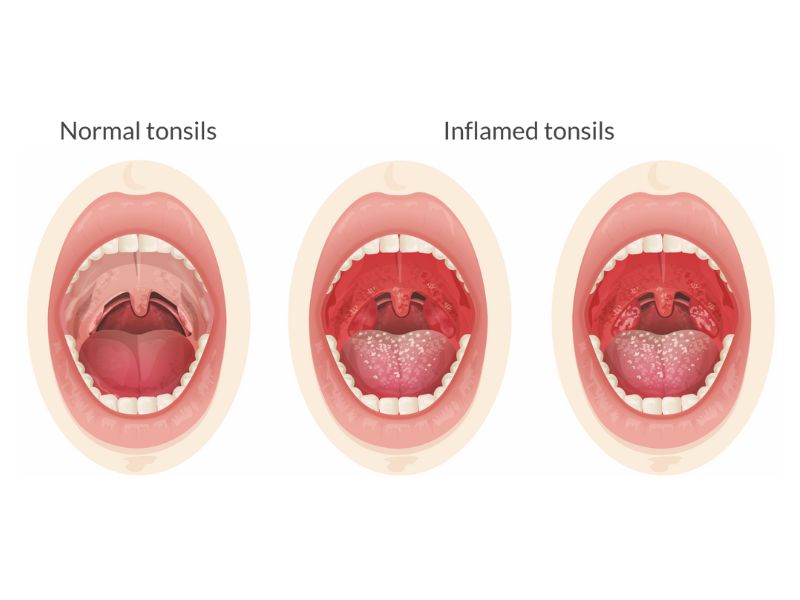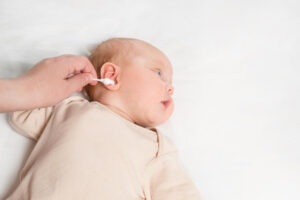All About Tonsillitis
Overview
Tonsils are two delicate masses of lymph nodes positioned on either side at the posterior of the throat. They are the immune system’s front line of protection against microbes like bacteria and viruses that enter the body. It aids the body in fighting infections by creating antibodies that nullify the microbes. This function of the tonsil makes it vulnerable to infection and inflammation. The infection and inflammation of the tonsils is termed as tonsillitis.

Tonsillitis can affect the people of all age groups, but it is most frequently seen in children and young adults. The reason for rare cases of tonsillitis among adults is because the tonsil’s immune system function declines after puberty. Tonsillitis usually recovers on its own with the help of some medications prescribed. But, when one starts having recurring sore throat, breathing problems or obstructive sleep apnea due to infected tonsils, an ENT surgeon might suggest a surgery.
Medical research has proved that the removal of tonsils in children does not have any harmful effect on their immunity system. Once removed, tonsils can not return. But in case some parts of the tonsils are left behind in the throat following the surgical procedure, the chances of infection and enlargement is higher.
Types Of Tonsillitis
There are primarily three forms of tonsillitis:
- Acute tonsillitis – Its symptoms typically show up for 3 or 4 days. But in some cases it can last upto 2 weeks.
- Recurrent tonsillitis – It is when you have infected tonsils multiple times in a year.
- Chronic tonsillitis – It is when you have a tonsil infection for a long period.
Symptoms Of Tonsillitis
Someone affected with tonsillitis will show the following symptoms –
- Sore throat
- Fever
- Pain in swallowing
- Bad breath
- Ear pain
- Red tonsils
- Patches on the tonsils
- Lack of appetite
- Feeling sick
- Fatigued
- Enlarged glands
- Voice change
- Stomach ache
- Headache
- Drooling
Is Tonsillitis Viral or Bacterial?
Tonsillitis can be both viral and bacterial.
- Viral tonsillitis – 70% of tonsillitis cases are caused by viruses like colds and flus (influenza).
- Bacterial tonsillitis – Bacterial tonsillitis is commonly called strep throat and is caused by the bacterium group streptococcus. People without tonsils can still get affected by strep throat.
Causes Of Tonsillitis
The causes of tonsillitis can be summed up as:
- Bacterial infection – Strep throat
- Viral infection – Common cold
- Rhinoviruses, influenza virus – Common cold
- Parainfluenza – Laryngitis & coup
- Enteroviruses – Hand, foot and mouth disease
- Adenovirus – Diarrhea
- Rubeola virus – Measles
- Epstein barr virus – Glandular fever
- Herpes simplex virus
Frequently Asked Questions about Tonsillitis
Tonsillitis in itself is not contagious. But the viruses and bacteria that cause tonsillitis are highly contagious. One can catch these infections by:
- Kissing or bodily contact
- Sharing utensils, food or drink
- Close contact with a sick person
- Touching a contaminated surface
- Inhaling tiny droplets that becomes airborne when a sick person talks, coughs or sneezes
As tonsils predominantly affects children, the risk factors for them are:
- Tender age – Tonsillitis caused by bacteria is most frequent among children belonging to the age group of 5 to 15.
- Repeated exposure to germs – School going children have a close contact with their classmates and get repeatedly exposed to viruses and bacteria that can cause tonsillitis in them.
Tonsillitis can give rise to the following complications:
- Obstructive sleep apnea
- Otitis media (Middle ear infection)
- Scarlet fever
- Rheumatic fever
- Tonsillar cellulitis
- Peritonsillar abscess / quinsy
- Glomerulonephritis
Tonsillitis generally recovers on its own within a week without taking any antibiotics. One can use medicines prescribed by ENT physicians to alleviate the tonsillitis. Plenty of rest and fluid intake is a must if one has fever.
One should get their tonsils removed in the following situations:
- Constantly suffering from tonsillitis
- Trouble in breathing
- Had episodes of tonsillitis for more than seven times in the last year
- Had episodes of tonsillitis for five times or more in each of the last two years
- Had episodes of tonsillitis for three or more times in each of the last three years
- Difficulty in carrying out usual day to day activities
- Affected by sleeping disorders like snoring, obstructive sleep apnea, sinusitis, ear infections or dental abnormalities
- Affected by infection complications like neck abscess, peritonsillar abscess, rheumatic heart disease or glomerulonephritis
Diagnosis Of Tonsillitis

An ENT specialist diagnoses tonsils by:
- Examining the throat for redness, swelling or white patches on the tonsils
- Taking a note of other symptoms like fever, cough, runny nose, rash or stomachache
- Examining ear and nose for other signs of infection
- Checking the sides of the neck to if the lymph nodes are inflamed and tender
Treatment Of Tonsillitis
- Medication will be prescribed by the ENT doctor, depending on the basis of what caused the infection.
- In severe cases, the doctor might suggest the surgical removal of tonsils also known as tonsillectomy. It is a 20 to 30 minutes long procedure, usually performed under general anesthesia. The surgery methods include removal of tonsils using surgical instruments, diathermy, coblation, radio frequency ablation, CO2 laser and microdebrider.
The side effects of a tonsillectomy involves feeling sick, pain, earache, stiff neck, problem in swallowing, change in voice and change in taste for a few days after surgery. These are symptomatically managed with medication after surgery to keep patient comfortable.
The following home care methods are also helpful:
- Take sufficient rest
- Consume adequate fluids
- Consume soothing food and beverages
- Practice gargling with saltwater
- Humidify the air
- Take lozenges
- Take medications for pain and fever
- Take warm tea with honey
- Use throat sprays
- Avoid irritants
- Avoid putting extra strain on the voice
How to prevent tonsillitis?
One can prevent tonsillitis by following these steps:
- Practice washing hands properly
- Avoid sharing food, glasses, water bottles or utensils
- Change toothbrush after being diagnosed with tonsillitis
- Keep children at home when they are sick
When to consult a doctor?

Consult a doctor if the following symptoms show up:
- Sore throat with high fever
- Pain or discomfort in swallowing
- Excessive weakness or fatigue
- Complications in breathing
- Severe drooling







